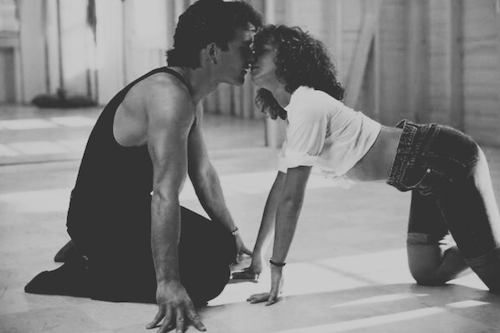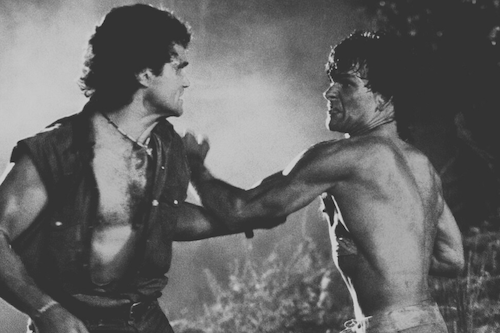This Week in Cinema, I Learned…Jun 23-29 2024
Written by Cameron Geiser
Welcome to This Week in Cinema, a yearlong film criticism project wherein I will be watching a new film that I haven't seen every single day.
I figured after all of the action, thrillers, conspiracies and car chases it was time to devote a week to a slower pace. Ah, Summer Love, it’s the most overrated and yet the most underrated thing about life. It just depends on the season of your life and the person you’re interested in. Every film this week concerns romance in some way, shape, or form. However, there was one hiccup in the week’s film selections. You see, I had planned for Jean-Luc Godard’s Band of Outsiders to be included, but I could not find a copy or format to watch the film in. After much frustration I gave up and looked into a short film from Robert Downey Senior called No More Excuses. While it wasn’t explicitly about romance, it does have a fair amount of on-the-street interviews with random people attending singles bars soooo, it’s at least partially related to the theme of the week? Overall this was a particularly good week score-wise, but did I learn anything? Her, Call Me by Your Name, and The Green Ray were my favorites of the week as each film addressed different aspects about love, courtship, sensuality, and even fate itself. These films taught me that the mysteries of the heart are vast, and that you should drop your expectations of a perfect romance. Love is strange, try to embrace the waves of emotion, just don’t drown in it.
June 23rd
Summer with Monika (1953)
3/5
I’ve been working through the films of Ingmar Bergman slowly, and this film came up a lot when looking into the famed filmmaker’s oeuvre. It certainly fits the summer theme, it’s right there in the title after all. Summer with Monika reminded me of Éric Rohmer’s early work in tone and sensuality, but that tone and story take a turn halfway through the runtime. Two young lovers in Stockholm begin their optimistic and naive summer lust at the onset of the season when they throw caution to the wind and discard their banal city lives by stealing the boy’s father’s boat and embarking on that great unknowable adventure. Unfortunately things start to get dire due to a lack of food and discovering that Monika became pregnant during those initial days of effervescence and limitless love.
While Harry (Lars Ekborg) attempts to plan for the future of their yet to be born child and themselves, Monika begins to change perspective. She is defiant in her desire to remain free of societal expectations and norms but it can come off as a bit petulant and unrealistic at times. Granted, non-conformity to pressures related to sex, gender, and the conventions of the era were rather ground breaking in 1953, and giving the perspective to the female character above all else was certainly a notion that Bergman would carry into his later works. Amongst all of the sensual eroticism of the first act and the inevitable waves of reality crashing in, Monika would rather do what she must to maintain her new life and sense of self which blends to create a fascinating picture, but one that ultimately makes it a bit of a mixed-bag. Summer with Monika showcases Bergman’s evolution towards the female perspective of his later works like Persona through sultry imagery and lush cinematography, making this a curiously languid stepping stone in his career.
June 24th
The Green Ray (1986)
4/5
Éric Rohmer’s The Green Ray feels very much connected to his earlier works in the Six Moral Tales. We follow one character through naturalistic settings exploring their inner and outer complexities of life, of love, even fate and destiny through exposure to different people and places. Though this time around our lead is a woman named Delphine (Marie Rivière). She lives in Paris and was about to go on her summer vacation with a friend who changed plans at the last second. Delphine still has her vacation time allotted, so what is she to do? That's what the film is broadly about. About searching for meaning in the mundane.
Delphine is a refreshingly realistic character. She's anxious and indecisive about what to do, where to go, and who to go with. She sees another group of friends but realizes she's the only single one and decides to leave. Some of her family try to get her to go with them to vacation in Ireland, but she's uninterested. She calls her ex-boyfriend (an offscreen presence that weighs heavily on Delphine as she finally accepts that the relationship is over) and goes to the mountains to stay at his apartment there. She despises the crowds and atmosphere though and heads back to Paris without staying the night. Most of the film occupies this space in between seasons of life, of uncertainness, of unknown opportunities.
After some time on her wandering Delphine overhears a small cadre of older women discussing the Jules Verne novel, The Green Ray, in which they describe the phenomenon of light that can occur on clear nights when the sun descends into the ocean and a green flash can appear. They say it can be a sign of finding true happiness, and within the final fifteen minutes of the film Delphine does stumble upon a man that she connects with and together they witness the titular flash of color therefore shading the final frames with hope, optimism, and a sense of relief for Delphine. Good things can happen, even when it seems like the world is empty of magic, it is possible to witness fleeting moments of beauty, and hopefully you can share that with another.
June 25th
No More Excuses (1968)
3.5/5
My original plan for the 25th was to watch Jean-luc Godard’s Band of Outsiders, but to my dismay I could not find a way to watch this film in any format available. So despite the lack of options I figured I’d check out what the Criterion Channel (Criterion’s streaming service) had available. There I found a series of cinematic works by Robert Downey Senior, and having only seen his son’s work, I figured, hell, why not now? The piece I landed on was one of his experimental short films (around 45 minutes long) called No More Excuses. The film is split into intercut sections that include a passionate activist attempting to convince the audience of the need- no, of the moral imperative really, of clothing your pets. There’s also the time traveling Civil War soldier (Robert Downey Sr.) who blips into the late 1960s and wanders around the place, astounded and mystified by it all.
There’s also a good portion of the short wherein Downey Sr. takes to the streets and interviews random people at singles bars, a rather new phenomenon in 1968. The strangest parts involve a sexual assault with uncomfortable suggestive twists like a Chimpanzee partner partaking in the act as a song by the Monkees plays, definitely weird stuff. It was certainly uniquely entertaining, but the best stuff was the “clothe your animals!” PSA and the many candid and blunt interviews of singles club goers. What a time.
June 26th
Call Me by Your Name (2017)
4.5/5
Luca Guadagnino’s Call Me by Your Name is yet another film that reminded me very directly of Éric Rohmer’s work. Taking place in the summer of 1983 in Northern Italy the story mostly resides within Elio Perlman’s (Timothée Chalamet) family summer home which his parents host academic programs in while vacationing. This is what brings Oliver (Armie Hammer) into the picture. I'm not sure if I've ever seen a more effortlessly sensual film that perfectly straddles the line between exploring the characters’ sexuality without being too crude or prudish. In fact there is no judgment from any characters on screen, nor from behind the lens- which is just plain refreshing. The score is mostly cascading intimate piano work, pointedly this is the instrument we see Elio practicing the most over his hot summer days, and the setting plays into this macro sense of history and curiosity.
In fact the film is fascinated with the notion of curiosity. Elio’s parents, and Oliver as a student of writing, history, and language- are all obsessed with discovering truths, digging into humanity's past quite literally sometimes, and the arts broadly. Despite the steamy romance that builds over the runtime, Call Me by Your Name also expertly depicts the physical sensations of summer. Listless boredom, quiet discoveries, burdensome heat, and the satisfaction of swimming on a hot day. I was taken aback by how lovely this film was, the romance was immersive and believable, but the heartbreak was even better.
June 27th
Dirty Dancing (1987)
3/5
Before this the only Patrick Swayze film I’d seen was Point Break, and while I still think that film is my preferred Swayze performance, this film (and Road House below) made me realize how far Swayze's stardom could and would go from this point forward. While the film is fairly predictable and stock in its structure, admittedly there’s a bit of movie magic taking place. Luckily Swayze and Jennifer Grey, “Baby”, have enough charisma and dancing skill to earn that title and be charming on screen together, but there’s just not much story taking place overall. It’s not overly concerned with ambitious ideas or heady writing- No, Dirty Dancing just wants to entertain you with some sexy dancing and a bit of smolder from Swayze at times. Nothing wrong with a competent feel good flick.
June 28tH
Her (2013)
4/5
I've only seen one other Spike Jonze film before Her, and that was Being John Malkovich (a truly oddball flick that I highly recommend). When I first heard about this film I wasn't all that interested in the concept of Joaquin Phoenix falling in love with his Iphone. However I'm here to report that it's, thankfully, so much more than that simple premise. Frankly, in the world of Her things appeared odd right away. The people and technology of this alternate near future are idiosyncratic, emotionally stunted, and unable to discern complex emotional connections in a healthy manner. Theodore (Joaquin Phoenix) works as a letter writer, composing heartfelt handwritten letters for people to send off to their loved ones as if they themselves had written it. Chat GPT for the poetic illiterate invalid in your life.
As if that wasn't weird enough, soon a new A.I. software named Samantha (Scarlett Johansson) appears as the next step in technological assistants. After what Theodore has gone through with previous lacking A.I. programs, particularly the “Dead Cat” bit had myself and friends cackling with laughter at the absurdity of the moment, he decides to give the new one a go. While by the end of the movie Samantha has earned some credit by “breaking up” with not just Theodore but all of humanity- a lot of the technology in this world seems incredibly emotionally manipulative and predatory in nature. Samantha turned out to be pretty okay in the end. She was just overwhelmed by all of the crazy oddities of human psychology- and honestly, who can blame her?
June 29th
Road House (1989)
3.5/5
Patrick Swayze thankfully had more to do this time around. Dalton (Swayze) is hired by the owner of the Double Deuce, a small town bar known for being the rowdiest bar in the county, to clean the place up and rid it of all the hooligans. Once there Dalton starts to set things straight by teaching new bouncers all the rules of the game, so to say. As you might expect Dalton gets acquainted with a beautiful love interest, Doc (Kelly Lynch), when she sews him up after a knife fight at the Double Deuce. Doc also happens to be the “lust interest” of town villain Brad Wesley (Ben Gazzara), who failed to capture her heart in the past. Dalton has a few tricks up his sleeve, he does have a Ph.D. in Philosophy after all, and basically ends up “saving the town” through violence but ultimately denying his impulse to kill. Not before ripping a man’s throat out though! It’s alright, and certainly worth a watch!
Cameron Geiser is an avid consumer of films and books about filmmakers. He'll watch any film at least once, and can usually be spotted at the annual Traverse City Film Festival in Northern Michigan. He also writes about film over at www.spacecortezwrites.com.










